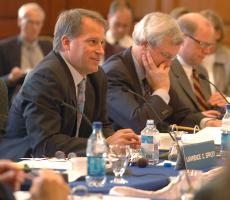Trustees look to expand online

University of Illinois Board of Trustees Chairman Lawrence C. Eppley discusses the future of online degree programs at U of I during the Board of Trustees meeting in the Illini Union on Thursday morning. The meeting was attended by U of I President B. Jo Patrick Traylor The Daily Illini
Sep 8, 2006
Last updated on May 12, 2016 at 04:20 a.m.
The University’s Board of Trustees heard details of the operating budget for 2007 at their meeting Thursday to the sound of American Federation of State, County and Municipal Employees (AFSCME) Local 698 picketers gathered outside of the Illini Union, 1401 W. Green St.
The Board discussed their initiative to expand the online sector of the University. The project, which is currently working under the title “Global Campus,” is planned to offer degree, certificate and outreach programs primarily, but not solely, via the Internet.
Operation of the system is tentatively planned to commence in January 2007, but will require large-scale planning within the coming months.
Chet Gardner, overall project leader, outlined the project and addressed questions posed by the Board.
Get The Daily Illini in your inbox!
Trustee Frances Carroll said she believes that the University can no longer wait for someone else to take the lead in establishing a large-scale movement of a traditional university into this new arena of learning.
Though several large universities have attempted a move toward online learning in the past, few have found their projects a success.
Gardner said that New York University and Cornell attempted the project during the dot com boom of the late 1990’s, but failed. The atmosphere for such a project is more accepting now, he said, as society has become more comfortable with and has acquired a greater appreciation for the online environment.
“The social and technological factors are there now for this type of project,” Gardner said.
University President B. Joseph White said he believes there is “a tremendous amount of scar tissue” in the field due to earlier failures by other universities. However, he said that while others attend to their own scar tissue “we have the potential to be highly innovative.”
Trustee Kenneth Schmidt expressed his concerns about the project in saying that the University must strive to be “the premier in the field or it should not be done at all.”
Admission criteria for the programs offered by the University must not be lost, he said. However, he said he believed the possibility for current students to take classes online while studying abroad could be a great opportunity.
Chairman Lawrence Eppley said he felt that the desire in the project is not to replicate the approach taken by the University of Phoenix but that their online ventures have proved there is a market for this type of project for those who cannot attend traditional universities.
Sperling expressed his concern in maintaining the prestige of the University and said he hoped that steps would not be taken without considering the possible affect posed to the institution’s credibility.
The trustees also discussed the $3.7 billion proposed operating budget, which includes all three campuses of the University system. The budget addresses deferred maintenance costs and represents a $207 million increase in operating funds from 2006.
Also addressed at the meeting was the requested budget for the 2008 fiscal year. The University is requesting $101 million in new funds for the coming year.
Under the proposed request, funds generated by the added $500 per academic year fee that took effect for this fall’s incoming freshman will go toward deferred maintenance, increases in energy costs, financial aid and competitive salary adjustments for faculty.
Trustee Robert Sperling gave his support for salary increases based on merit, but said he does not want to see the University lose faculty because of an inability to pay market rates.
Payment of an estimated additional $84,000 was also approved by the Board to maintain a contract for financial aid processing.
The contract allows an outside company, Affiliated Computer Services, Inc., of Lombard, Ill., to process 1098-T forms, which contain information pertaining to scholarship, grant and fellowship assistance received by students. The Board hoped that this service would be available through Banner, but the web service is not capable of displaying fellowship assistance for students.
The new total required for processing of the forms is $313,000 for the fiscal year 2007. Banner, a large investment for the University, could not complete the task.
“I doubt we knew that we knew [that Banner did not have such capabilities],” said University President B. Joseph White. “We were looking for full capabilities with Banner, but in every new system you get surprises and you have to put patched on them but our hope, our goal is to mend them.”





